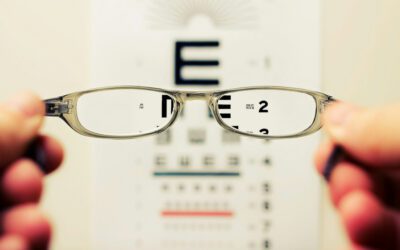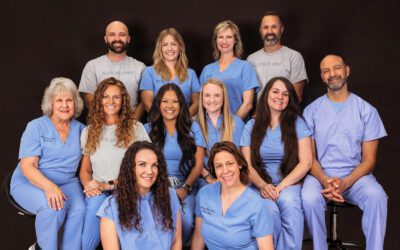Dewayne Wilson, fifty-two, of Fort Smith, says he’s never had a “real vacation.” The construction worker and father of two likes to stay busy. But in March 2022, an unexpected medical emergency stopped him in his tracks.
“I got a routine before work: I get up at 4am go and take my shower, fix my coffee,” Dewayne said. “I was getting ready for a shower, and I was fixing to shave. I was sitting there watching myself in the mirror and started getting dizzy.”
His left side was weak. He couldn’t call out to his wife for help. Struggling to keep his balance Dewayne tried to sit down, but instead fell to the bathroom floor.
“During all that time they heard everything, all the commotion, and that’s when my wife came in and found me on the floor,” Dewayne said. “She took one look at me and knew what was going on.”
Dewayne was experiencing a stroke.
SIGNS OF STROKE
Signs of a stroke can vary in patients, but common symptoms include:
Loss of balance
Blurred vision
Facial drooping
Arm weakness
Slurred speech
Numbness or tingling in the parts of the body
Dewayne’s wife called 911. When first responders arrived, they quickly assessed Dewayne and notified Baptist Health-Fort Smith of his condition.
CODE STROKE
“Once they recognize there are stroke symptoms, they activate a ‘Code Stroke’ for our hospital,” said Dr. Mohammad Owais, a neurologist. “’Code Stroke’ means the alert will go to our emergency department, our CT department and the neurologist about a potential stroke coming to the ER. So, everybody can be prepared.”
An ischemic stroke happens when a blockage cuts off the blood supply to part of the brain. It’s important to quickly restore blood flow because in this situation “Time is Brain.” Millions of neurons are lost with every minute of stroke, according to the National Institutes of Health. Neurons are nerve cells that send messages all over your body to allow you to do everything from breathing to talking, eating, walking, and thinking. Stroke is the fifth leading cause of disability and death in the United States. For every fifteen minutes that treatment is delayed, the patient’s mortality increases by five percent.
Dr. Owais was a member of Dewayne’s care team that day. It was determined that Dewayne needed a tissue plasminogen activator, or more commonly called tPA, a “clot buster” medication. “Mr. Wilson’s ability to recognize symptoms and act as fast as he could, gave us all the opportunities to help him,” said Dr. Owais. “We were able to give him the clot buster medicine. We were able to give him a thrombectomy and our facility was capable of doing both procedures in a timely manner.”
Dr. Clint Wood, an interventional neuro-radiologist at Baptist Health-Fort Smith, performed the thrombectomy, which is a type of surgery to remove a blood clot formed inside an artery or vein. A thrombectomy greatly reduces the risk of death or permanent disability if performed promptly.
RECOVERY
Dewayne spent eight days in the intensive care unit. A team of nurses, physicians and therapists who are specially trained in stroke recovery took care of him. He was able to get up, walk and recall pieces of what happened that morning before the ambulance arrived. Dewayne spent another three months at home recovering with the help of his family and home health nurses.
During that time, Dewayne used a walker and focused on regaining his mobility and independence. He even picked up a new hobby: building with LEGO®s. Dewayne believes the detailed manual and small pieces improved both his focus and dexterity. His favorite creation was a Jurassic Park-themed set, complete with a pterodactyl.
Now, a year later, Dewayne is back to his routine of working hard and spending time with his wife and two teenage children. But he says now he strives to eat healthy, well balanced meals of lean meats and vegetables, as well as get plenty of exercise.
Both he and his wife can’t stress enough the importance of educating yourself about the risk factors of stroke. “Especially when you start getting up to like my age, talk to your doctor about the warning signs,” Dewayne said. “Get educated, because I never thought about it.”
PRIMARY STROKE CENTER
Baptist Health-Fort Smith is a Joint Commission-certified primary stroke center and able to meet the unique and specialized needs of stroke patients. In collaboration with the American Heart Association/American Stroke Association, the facility continues to make exceptional efforts to foster better outcomes for patients.
“We want to help people. We want to see people go back to their work and take care of their children. We want to see them happy with their children and family,” said Dr. Owais. “That’s what makes us spend all the time that we spend and come as soon as we can and take care of them, even sometimes at the expense of our family, just to make sure that we did everything possible to make our patients’, our community’s lives better.”
Baptist Health-Fort Smith has also demonstrated sustained achievement for more than a decade by earning numerous awards, including the American Heart Association/American Stroke Association Get With The Guidelines®– Stroke Gold Plus, Target Stroke Honor Roll. Get With The Guidelines® – Stroke is an in-hospital program for improving stroke care by promoting consistent adherence to the guidelines, which can minimize the long-term effects of a stroke and even prevent death.
Dewayne said he is very thankful for the great care and compassion he received at Baptist Health. “Dr. Owais said when I walked in, I said, ‘You’re the man that saved my life,’” Dewayne said. “He goes, ‘No, I was just the tool that saved your life.’ It made me think, you know, you’re right. You know, good Lord saved my life and through you. And he did.”
To learn more about award-winning stroke care options at Baptist Health, visit BaptistHealthStroke.com or call 1-888-BAPTIST.




